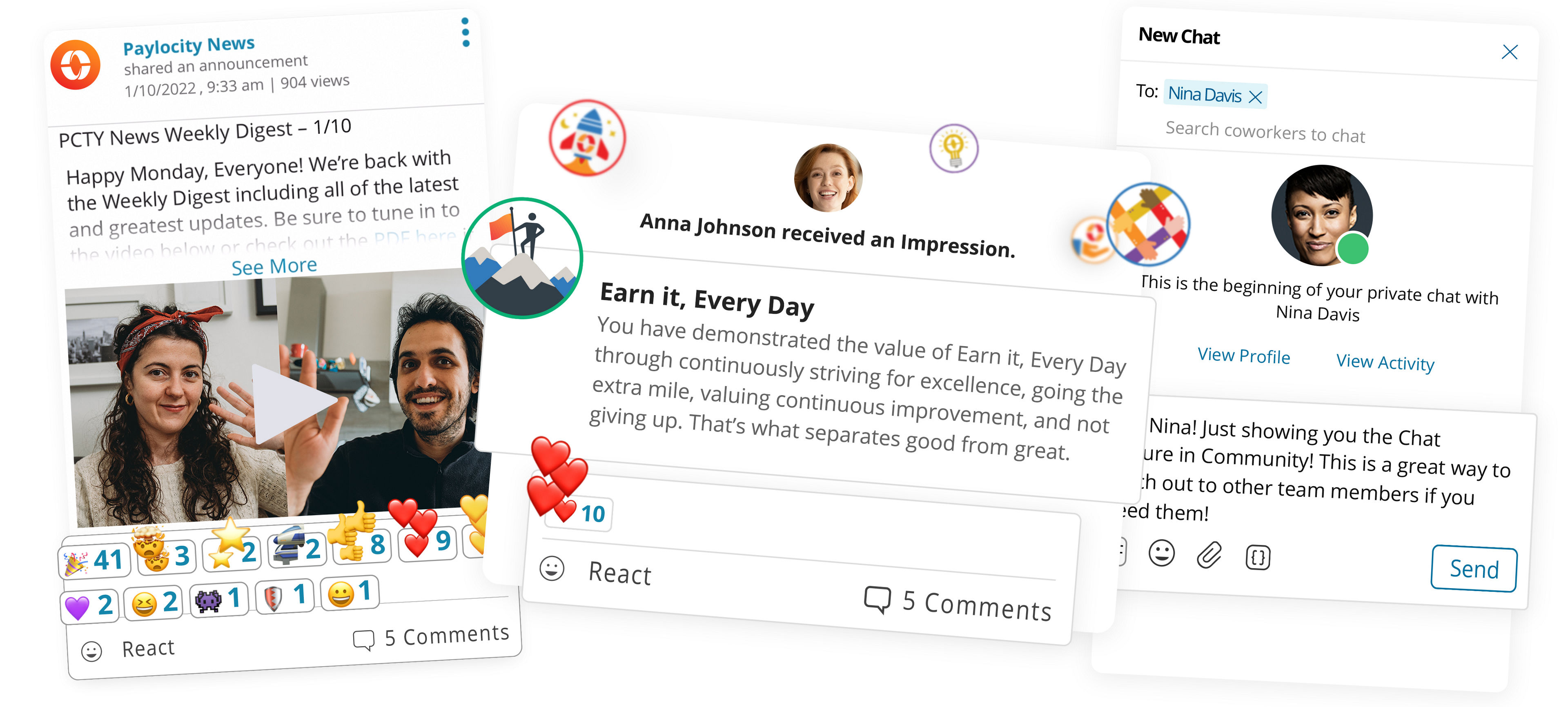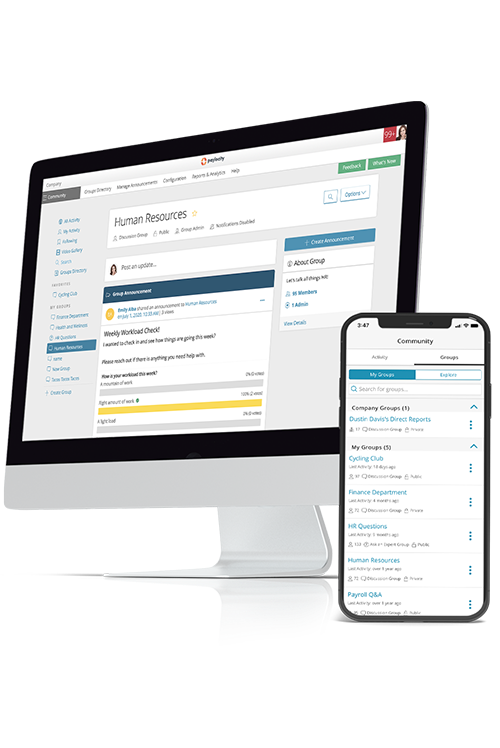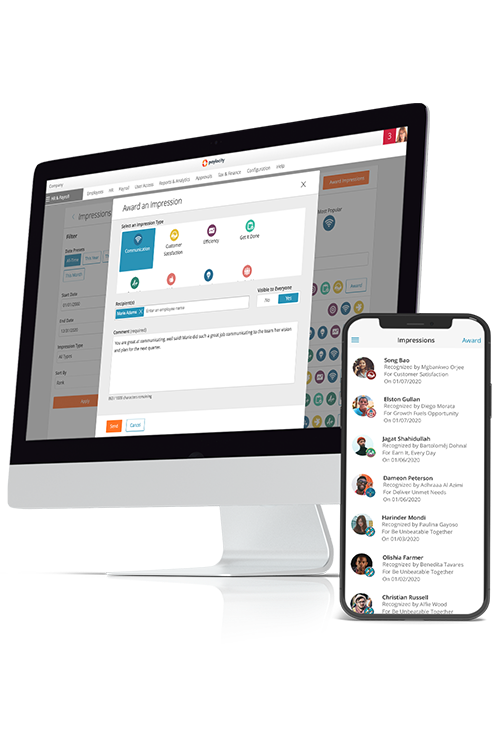resources

Remember when Zoom calls were the exception, not the rule? It wasn’t all that long ago that virtual work environments were uncommon. But as with most norms, the pandemic brought total upheaval.
Several industries have since seen a shift to remote and hybrid work, and as of June 2022, only two in 10 people work exclusively on-site. While virtual work presents plenty of benefits for employees and employers alike, working remotely comes with its fair share of challenges.
With fewer in-person interactions, how can employers keep employees interested, challenged, inspired, and motivated? Today, we’re sharing 13 virtual employee engagement ideas.
Why Is It Important to Engage With Remote Employees?
The success of your organization depends on employee engagement — research from Deloitte shows that engaged workers are 57% more effective and 87% more likely to stay with your company. Furthermore, corporate culture (the qualities that define an organization, such as its conduct policies and core values) is directly tied to business performance.
So, it's a no-brainer that organizations should inspire to create an engaged company culture. But before we get into how to do that, let's step back and define more specifically what employee engagement actually is.
What is Employee Engagement?
Employee engagement is the level of commitment and connection an employee has to an organization. Highly engaged employees are dedicated to their work, their colleagues, and their organization’s mission. Disengaged employees, on the other hand, tend to do the bare minimum and remain secluded from the rest of the team.
Of course, it’s important to engage your entire workforce, but employers must take special care to support remote workers and make them feel connected. You’ll see better performance, higher retention rates, and increased morale. But it doesn’t come without its challenges.
The Challenges of Virtual Employee Engagement
In the ancient in-office days of yore, employee engagement was all about conference room birthday parties, learning lunches, or happy hour get-togethers. It was natural, it was normal. And now it feels rather cliché….
These sorts of activities build camaraderie and can help create a positive perception of employers and workplaces. But when many (if not most) employees work remotely, sometimes in different time zones, how can employers foster that sense of community and shared commitment, while motivating and empowering their employees?
A few employee engagement challenges related to engaging virtual employees include:
- Communication: Nothing can quite replace in-person conversations, or the way employees are able to bond when crowded around coffee makers or sitting in meetings beside each other.
- Relationships: Fostering bonds in a hybrid work culture takes a different approach than the natural bonding that can happen in person.
- Motivation: When employees don’t work within the vicinity of their supervisors and peers, remote employees may not feel like they’re making an impact or getting the same kind of recognition.
There are plenty of virtual engagement ideas for remote workers that organizations can use to keep their employees interested, excited, and connected to their work. But rather than relying on sending snack boxes or company swag, employers should choose activities that encourage participation. Team building is valuable for creating a collaborative, productive workplace that keeps employees involved.
Businesses big and small, corporate or casual, can benefit from putting an effort into virtual employee engagement activities that ensure employees remain dedicated to their jobs and their employers.
10 Virtual Employee Engagement Ideas
Employers have to think out of the box for ways to engage remote employees. But that’s a benefit, not a drawback! While it might seem like a daunting task, leaning into the benefits of virtual work can help you develop remote employee engagement activities that excite employees and positively impact their working experience.
1. Enable Easy Communication with Colleagues
Engaging employees is impossible when you can’t communicate with them — or when they can’t communicate with each other. But by giving your entire workforce access to a social collaboration tool, you can enable collaboration and connection among employees, no matter when and where they’re working.
Functionalities like chat and file sharing streamline communication, and a social media-like feed encourages participation. Plus, leadership can reach all employees at once so nobody is out of the loop.
Enabling easier communication allows your employees to stay plugged in when they’re clocked in, ensuring they’re engaged — even from afar.
2. Help Them Create a Productive Home Office
Not every virtual employee will have chosen their abode with virtual work in mind, or have a room they can easily convert to a home office. One way that employers can show employees they’re invested in their virtual success is to assist them in setting up a home workspace.
Whether employees need specific equipment to do their jobs or simply the technical support to get up and running, employers can support them in a number of ways during the setup phase. Helping to create an inspiring and comfortable working environment for your virtual employees can help boost their productivity as well as their job satisfaction.
3. Recognize Their Performance
Although recognizing a remote employee’s performance takes more work than swinging by their desk, it’s well worth the effort to prioritize these acknowledgements. When employees know their work is valued, they’re happier, more engaged, and more likely to stay with the organization.
Manager support is crucial, but leaders are often too busy to see the day-to-day accomplishments of their employees. With peer recognition software, employees can give each other virtual kudos that managers can then view for formal performance reviews.
Peer recognition gives employees a chance to feel seen for their contributions, and for leaders to have clearer visibility.
4. Create Virtual Water Cooler Gatherings
It may seem cliché, but the proverbial water cooler was a boon to employee engagement. It was a natural, unforced gathering place that got employees out of their cube and bumping shoulders with colleagues.
So, how can you replicate the office watering hole in a virtual environment?
Virtual group chats are a nice way to simulate the togetherness that impromptu office gatherings can cultivate. Whether your business uses Microsoft Teams, Slack, or another conversation software, encourage employees to participate in group conversations on not-always-work-related topics.
This might be a weekly show-and-tell, themed “gatherings” on favorite TV shows or current events, or even simply everyone giving an answer to the same question. Think, “If you could have dinner with one person dead or alive, who would it be?”
In Paylocity’s Community, team members are able to quickly communicate and touch base in Chat. Not only can they catch up and socialize, but they’re able to share files and collaborate when talk turns to work topics.

5. Plant a Virtual Team Garden
With the rise of working from home in 2020 came the rise of the house plant. Never before has there been such an interest in growing and nurturing plants in homes (and home offices). Why not encourage the trending habit, and add it to your list of virtual employee engagement ideas?
Provide each employee with the essential ingredients and equipment to raise a plant: a pot with soil, seeds, and instructions for their plant variety. Then, schedule check-ins with your team to share your plant’s progress, problem-solve anything not going well, and talk about the experience.
6. Host Your Own Ted Talks
Whether you incorporate Ted Talk-style presentations into existing meetings, or set them up as individual events, they’re a fantastic way for employees to get to know each other and feel connected on a more personal level. When it comes to virtual engagement activities, this is one that might surprise and inspire employees.
Encourage employees to speak on a topic they’re knowledgeable and passionate about. It might be a significant life experience that’s shaped their path, a skill they’ve learned and practiced, or perhaps explanation of something they do in their work that they think is misconceived or not fully understood.
In terms of leadership and employee engagement, use these “Ted Talks” as an opportunity for leaders to share wisdom they've gained and experiences that can be beneficial to their teams. Obstacles they’ve overcome, personal stories that informed their career choices, and life lessons they’ve learned along the way are great subject matter.
One way you can do this is through Paylocity’s Video feature. It’s a seamless integration with your payroll and HR platform, where instructional or motivational videos can be naturally shared in spaces your employees are already using for day-to-day work.
7. Run a Healthy Habit Challenge
Working remotely can unfortunately contribute to an increase in unhealthy habits, with readily available snacks as well as the appeal of potentially not getting out of pajamas until the day is well underway.
However, virtual employees can enjoy and benefit from company-led initiatives to improve their mental and physical health. Healthy habit challenges are some of the best work-from-home engagement activities because they support employees’ physical and mental health, which benefits them both personally and professionally.
Healthy habit challenges can vary greatly and encompass different aspects of health. For example, you can challenge employees to track the number of glasses of water they drink each day, or embolden them to take 20 minutes daily to do something for their mental health.
Just be wary of physical challenges that may leave out employees. If you decide to incentivize these challenges, be sure to also showcase how your organization supports employees’ health.
8. Hold Virtual Birthday Parties
If you’ve ever had the pleasure of discovering birthday cake in an office kitchen, you know how nice it can be to celebrate birthdays in the workplace!
But for virtual employees, there might not be any sort of recognition when there’s a birthday. Bring back the happy birthday party vibes by having virtual birthday parties, and rest assured this is one of the virtual employee engagement ideas your employees will love!
Hold a “surprise” meeting where colleagues celebrate the employee’s birthday and name their favorite thing about working with them. Encourage employees to send good cheer with a designated birthday channel in your team’s chat platform. And this doesn’t just apply to birthdays. Work anniversaries and other milestones are worth commemorating, too!
If your team is too big to recognize every occasion, monthly parties can still bring some much-needed cheer to the “office” and recognize multiple employees at once. Some employees might appreciate not having the full spotlight on them anyway.
To make employees feel extra celebrated, send them virtual gift cards for a coffee, movie, or something else you know they’ll enjoy with their free time.
9. Schedule Virtual Happy Hours
You’ve likely heard of virtual happy hours, but what’s important when it comes to employee engagement ideas for remote workers is that the activity is engaging. That’s to say, it’s not enough to put a happy hour on the calendar and hope employees show up. Make it fun!
And, don’t ask them to join in during their free time after work. Block off the last hour of the work day and dedicate it to your employees relaxing and enjoying each other’s virtual company.
Virtual happy hours are ideal for online games for employee engagement. Once employees “have arrived” with their choice of beverage, set up a game of trivia, ice breakers, or other games to keep them entertained and enjoying themselves while spending time with one another.
If you really want to step a virtual happy hour up a notch, mail your employees their choice of virtual craft cocktail or mocktail kits to make and enjoy during your time online together. Food based events are just as fun — try out a virtual ice cream social or even a cooking class for some delicious team bonding.
10. Show and Tell
With many virtual employees working from home, coworkers often enjoy occasional appearances made by pets, partners, or children during video calls. One of the most interesting virtual engagement activities you might host for your employees is a virtual Show and Tell.
Add your Show and Tell to a regularly scheduled team call, or create a standalone meeting. Suggest employees show something from their surroundings at home that makes their home work environment better. This will help you see different sides to your employees and get to know them better.
Employees’ personal and professional lives are inextricably linked, so it’s important to make it clear that you see them as more than just bodies filling desks.
What Virtual Employee Engagement Ideas Will You Try?
Engaged employees are the single most important asset your organization has, driving more revenue, promoting higher office morale, and bringing projects to fruition faster than employees who aren’t engaged. They’re also more communicative and more productive than their less engaged counterparts — so engaging and retaining them is critical.
However you go about engaging employees, prioritizing connection is key. Workers want to feel like they’re connected to an organization they work for, so be sure to give them the tools to communicate and collaborate with their colleagues.
With a bit of intentionality (and the right technology), you can encourage camaraderie among teams and build an engaged company culture.




